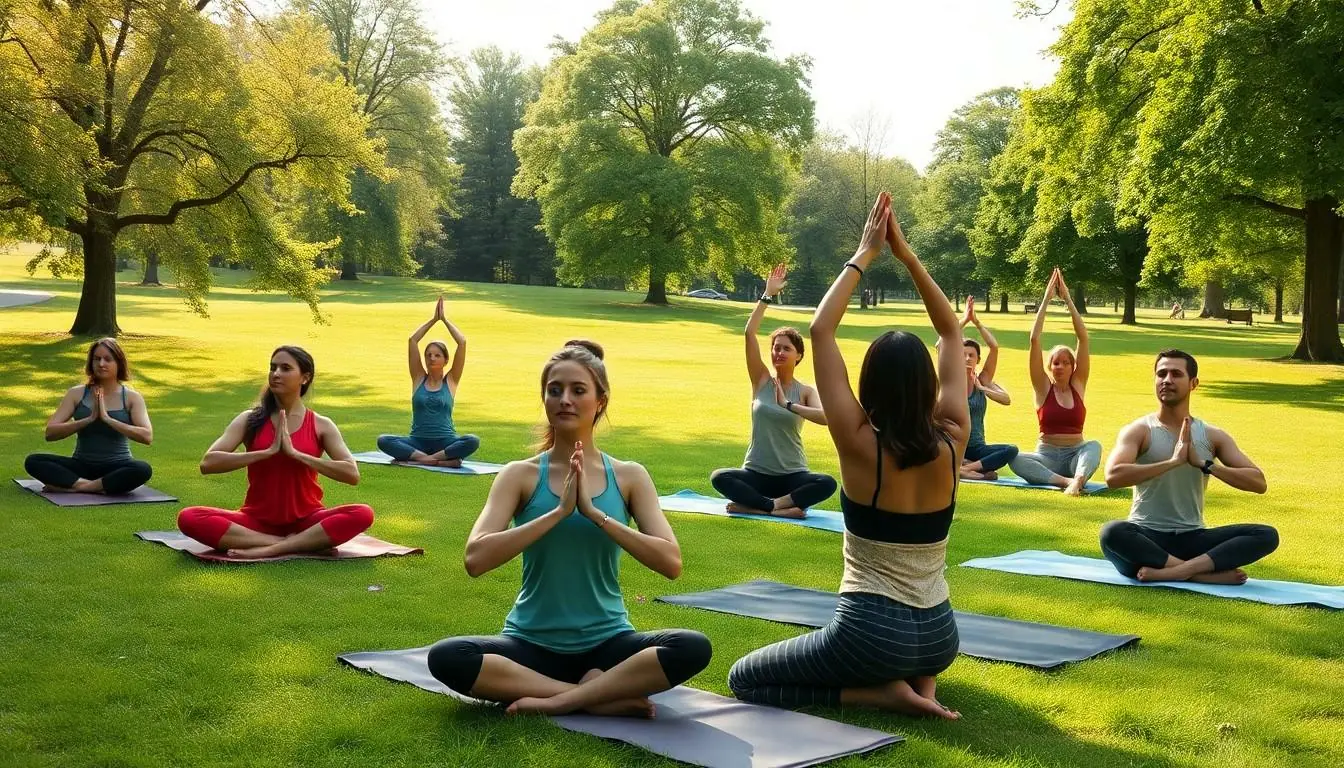Table of Contents
ToggleIn a world buzzing with distractions and endless to-do lists, it’s no wonder people are searching for a way to hit the pause button. Enter mindfulness coaching—the superhero of stress relief, ready to swoop in and save the day. Picture this: a calm oasis amidst the chaos, where individuals can learn to embrace the present moment without the weight of yesterday’s worries or tomorrow’s to-do list.
Mindfulness coaching isn’t just about sitting cross-legged and chanting “om.” It’s a practical approach that equips individuals with tools to navigate life’s rollercoaster with grace and humor. By cultivating awareness and reducing anxiety, mindfulness coaching transforms everyday chaos into manageable moments. So, if life feels like a never-ending game of whack-a-mole, it might be time to explore how mindfulness coaching can help turn that frenzy into focus.
Understanding Mindfulness Coaching
Mindfulness coaching combines techniques aimed at enhancing awareness in the present moment. This approach helps individuals cope with stress and anxiety through practical strategies.
Definition and Principles
Mindfulness coaching refers to a structured method that fosters self-awareness and emotional regulation. It emphasizes being present and fully engaged in the moment, promoting acceptance rather than judgment. Coaches often encourage clients to practice techniques like meditation, breathing exercises, and reflection. Through these practices, individuals learn to observe their thoughts and feelings without attachment. Additionally, it focuses on integrating mindfulness into daily routines, making it a sustainable practice for long-term benefits.
Benefits of Mindfulness Coaching
Mindfulness coaching offers multiple advantages that enhance overall well-being. Improved stress management occurs as individuals develop coping mechanisms for overwhelming situations. Enhanced focus and concentration result from the ability to stay present, which boosts productivity. Greater emotional resilience emerges when clients learn to navigate life’s challenges calmly. Moreover, enhanced relationships often develop as individuals practice active listening and empathy. These benefits collectively contribute to a more balanced and fulfilling life.
Techniques Used in Mindfulness Coaching

Mindfulness coaching employs various techniques that enhance present-moment awareness. These methods help manage stress and promote emotional well-being.
Meditation and Breathing Exercises
Meditation techniques play a crucial role in mindfulness coaching. Practitioners often focus on deep, intentional breathing to center themselves. Guided meditation sessions encourage clients to observe thoughts non-judgmentally. This practice fosters a calm mind and reduces anxiety. Additionally, various breathing exercises help regulate emotions and enhance focus. Techniques like box breathing or 4-7-8 breathing provide simple, effective tools for immediate stress relief.
Mindful Movement Practices
Mindful movement practices incorporate physical activity into mindfulness coaching. Activities such as yoga or tai chi promote body awareness and relaxation. Participants engage in gentle movements while concentrating on breath and bodily sensations. This connection enhances the mind-body relationship, improving emotional regulation. Furthermore, mindful walking can help individuals cultivate presence in daily activities. These practices encourage clients to experience movement as a form of meditation, supporting overall mental clarity.
The Role of a Mindfulness Coach
Mindfulness coaches play a critical role in guiding individuals through their journey toward enhanced awareness and emotional balance. They equip clients with the necessary tools to navigate life’s complexities effectively.
Qualifications and Training
Mindfulness coaches typically hold certifications in mindfulness practices and related fields such as psychology, counseling, or healthcare. They may also complete specialized training programs focusing on mindfulness techniques and coaching strategies. Many coaches engage in continuous education to stay updated on best practices and emerging research. This ongoing commitment strengthens their skills in guiding clients effectively. Experience in meditation, stress management, and therapeutic approaches is common among qualified coaches. By combining these elements, they offer a comprehensive approach to mindfulness coaching that fosters transformative change.
Building Client Relationships
Establishing trust is essential for mindfulness coaches. They prioritize creating a safe and supportive environment for clients to explore their thoughts and feelings. Active listening and empathy are key practices that help in building strong connections. Coaches often tailor their approach to meet individual client needs, considering each person’s unique experiences and challenges. Open communication encourages clients to express their concerns and insights, which enhances the coaching process. By fostering a collaborative relationship, coaches empower clients to engage fully in their mindfulness journey and work toward personal growth and well-being.
Mindfulness Coaching in Different Settings
Mindfulness coaching occurs in various environments, adapting to the unique needs of individuals and groups. Strategies employed in these settings enhance emotional well-being and promote a better understanding of mindful practices.
Individual Coaching
Individual coaching focuses on personalized mindfulness strategies that align with specific needs. During one-on-one sessions, clients gain tailored guidance to cultivate awareness and develop coping mechanisms for stress. Coaches often utilize techniques such as targeted reflection and customized breathing exercises. Individuals benefit from a safe space to explore their thoughts and feelings, fostering deeper connections to their inner selves. This approach allows clients to progress at their own pace, leading to significant improvements in emotional regulation and resilience.
Group Coaching
Group coaching creates a supportive community for individuals seeking mindfulness techniques together. Participants engage in shared experiences that foster connection and understanding. Group dynamics enhance accountability, encouraging members to practice mindfulness outside of sessions. Coaches lead participants through collective meditation exercises and discussion, allowing for shared insights. Learning in a group setting can amplify the benefits of mindfulness through diverse perspectives and communal support. Each session strengthens relationships among participants, contributing to improved emotional health and overall well-being.
Mindfulness coaching offers a powerful pathway to navigate the complexities of modern life. By fostering present-moment awareness and emotional balance, it equips individuals with essential tools to manage stress and enhance overall well-being. The combination of personalized strategies and supportive environments allows clients to explore their thoughts and feelings without judgment.
As practitioners continue to refine their techniques and expand their knowledge, the impact of mindfulness coaching on personal growth becomes increasingly evident. Embracing this practice can lead to greater focus, resilience, and fulfilling relationships. For anyone seeking to cultivate a more balanced life, mindfulness coaching stands out as a valuable resource.




